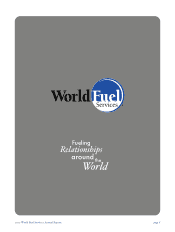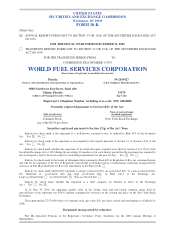World Fuel Services 2005 Annual Report Download - page 18
Download and view the complete annual report
Please find page 18 of the 2005 World Fuel Services annual report below. You can navigate through the pages in the report by either clicking on the pages listed below, or by using the keyword search tool below to find specific information within the annual report.filings as soon as reasonably practicable after such material are electronically filed with, or furnished to, the SEC.
In addition, our Code of Corporate Conduct and Ethics, Board of Directors’ committee charters, and Corporate
Governance Principles are available on our internet website. If we make any substantive amendments to our
Code of Conduct and Ethics or grant any waiver, including any implicit waiver, from a provision of the Code to
our Chief Executive Officer, Chief Financial Officer or Corporate Controller, we will disclose the nature of such
amendment or waiver on our internet website, in a periodic filing under the Exchange Act or in a report on Form
8-K. Our internet website and information contained on our internet website are not part of this Form 10-K and
are not incorporated by reference in this Form 10-K.
Forward-Looking Statements
Certain statements made in this report and the information incorporated by reference in it, or made by us in
other reports, filings with the SEC, press releases, teleconferences, industry conferences or otherwise, are
“forward-looking statements” within the meaning of the Private Securities Litigation Reform Act of 1995. The
forward-looking statements include, without limitation, any statement that may predict, forecast, indicate or
imply future results, performance or achievements, and may contain the words “believe,” “anticipate,” “expect,”
“estimate,” “project,” “will be,” “will continue,” “will likely result,” “plan,” or words or phrases of similar
meaning.
Forward-looking statements are estimates and projections reflecting our best judgment and involve risks,
uncertainties or other factors which may cause actual results to differ materially from the future results,
performance or achievements expressed or implied by the forward-looking statements. These statements are
based on our management’s beliefs and assumptions, which in turn are based on currently available information.
Examples of forward-looking statements in this report include, but are not limited to, our expectations
regarding our business strategy, business prospects, operating results, working capital, liquidity, capital
expenditure requirements and future acquisitions. Important assumptions relating to the forward-looking
statements include, among others, assumptions regarding demand for our products, the cost, terms and
availability of fuel from suppliers, pricing levels, the timing and cost of capital expenditures, outcomes of
pending litigation, competitive conditions, general economic conditions and synergies relating to acquisitions,
joint ventures and alliances. These assumptions could prove inaccurate. Although we believe that the estimates
and projections reflected in the forward-looking statements are reasonable, our expectations may prove to be
incorrect. Important factors that could cause actual results to differ materially from the results and events
anticipated or implied by such forward-looking statements include, but are not limited to:
• our ability to collect accounts receivable;
• changes in the political, economic or regulatory conditions in the markets in which we operate;
• currency exchange fluctuations;
• non-performance of third party service providers;
• our failure to effectively hedge certain financial risks associated with our business and our price risk
management services;
• non-performance by counterparties to derivatives contracts;
• material disruptions in the availability or supply of fuel;
• changes in the market price of fuel;
• adverse conditions in the shipping and aviation industries;
• uninsured losses;
• the impact of natural disasters;
• our failure to comply with restrictions in our revolving credit facility;
4
























